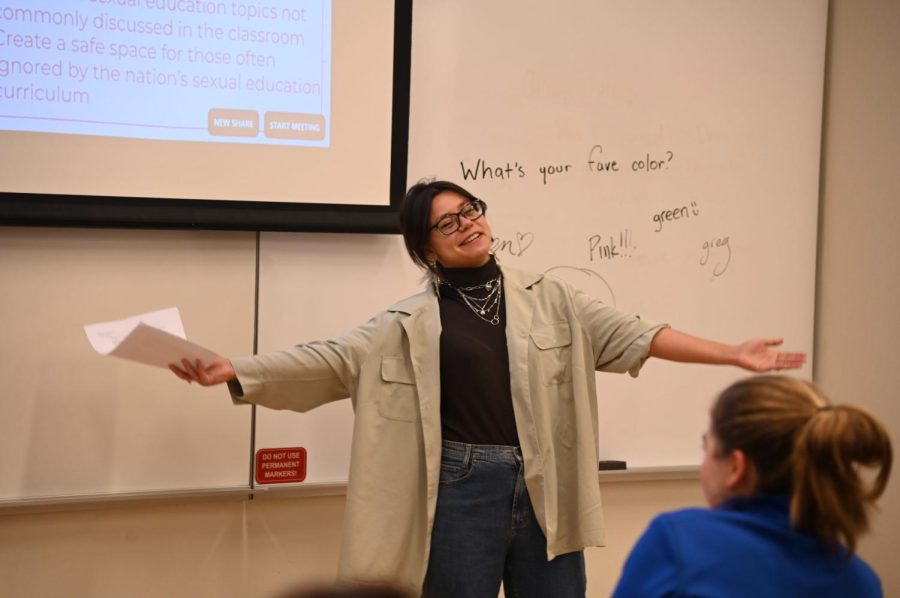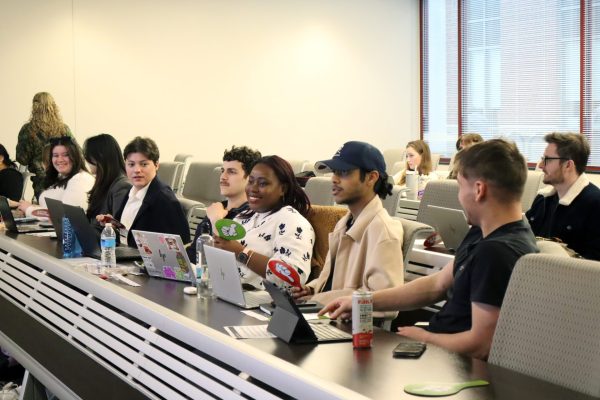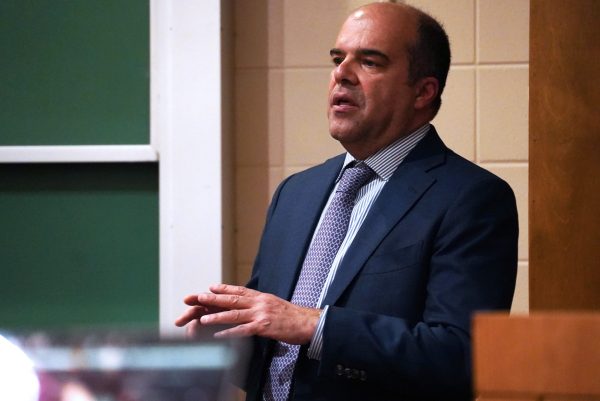‘Pillow Talk’ event encourages sex education conversations
Sophomore Maya Roman, a member of Planned Parenthood Generation Action at DePaul, speaks to the students in attendance at the “Pillow Talk” event.
Freshman Madison Webb considers herself lucky when it comes to the sex education she received at her public high school in Maryland. She grew up surrounded by a conservative student body which she believes caused school administration to combat traditional views on sex with a far more progressive curriculum.
Webb acknowledged that her experience learning about topics like coercion and consent during the lessons was different from what many others hear during school-mandated sex education. Due to this disparity, it prompted her to start her own series of lessons to help educate fellow students.
“Even the most comprehensive and inclusive sex education that we have in American public education systems is not adequate,” Webb said. “There’s not a lot of community surrounding sex education which is important for education in general so when you have lessons that are very detached, it’s not going to resonate with its target audience.”
Started by Webb and DePaul sophomore Maya Roman, the first Pillow Talk seminar took place on Jan. 26 as part of an ongoing monthly series of sex education lessons. Hosted by Planned Parenthood Generation Action at DePaul (PPGAD), the lesson entitled “Physical Sex Health Basics” focused on anatomy, stigmas surrounding sex, body image and contraceptives.
“It really just hit us how little comprehensive sex education there is, especially for university students which is really concerning,” Roman said. “We wanted to decrease stigmas and disprove misconceptions because everyone’s body is beautiful and you shouldn’t be ashamed of it.”
Roman and Webb worked to create a fun environment with an easy-to-follow Powerpoint presentation, interactive sections and a Kahoot game to put students at ease. They hope the friendly atmosphere helps students retain more information they may not have gotten from awkward situations in high school.
“Speaking with people rather than at them is key to any conversation because that’s what we’re trying to do, we’re trying to spark conversation,” Webb said. “We want people to talk with each other and ask questions, we don’t want them just to listen. We want to hear their stories because that’s how we connect and educate.”
Freshman Lucy Njaramba attended the event after seeing advertisements for it on DeHub and various flyers around the school. She felt that because her high school sex education was not cohesive, she wanted to learn more about the topic to protect herself. Njaramba recommends others to seek out sex education talks because of the resources they provide and its ability to fight the stigma around sex.
“It was uncomfortable but a learning experience,” Njaramba said. “I was still more comfortable being here though because in high school, you’re hearing all of this from older adults who are too nervous to even say medical terms. Being around college students who may not have proper education either was really nice.”
Sophomore Kenna Bartlett, president and founder of PPGAD, believes by having these conversations in a casual setting, hosted by peers rather than adults, it will create a more accessible environment for those who want to learn more about sex education. She wants to move away from the formality often seen when talking to authority figures, especially with the heavy and personal topic.
“If I can look at and connect with another college student on this topic, I’m meeting them where they’re at because I am where they’re at.” Bartlett said. “People involved in advocacy work or doing education talk about wanting to meet people where they’re at and the best way to do that is by being a peer.”
Roman and Webb’s plans for future Pillow Talks, include LGBTQIA+ sex education and the institutionalization of sex education. Bartlett believes having these conversations now as students experience more freedom in college is crucial to promoting health and safety on campus. The next Pillow Talk will focus on the impacts of sex on mental and emotional health and will be held in February.
“We’re in a time where people explore themselves, not even just sexually but also emotionally,” Bartlett said. “It’s an opportunity not only to play catch up but also to further broaden people’s understanding of what sex education actually includes. We’re ready to start being treated and talked to like adults.”
















